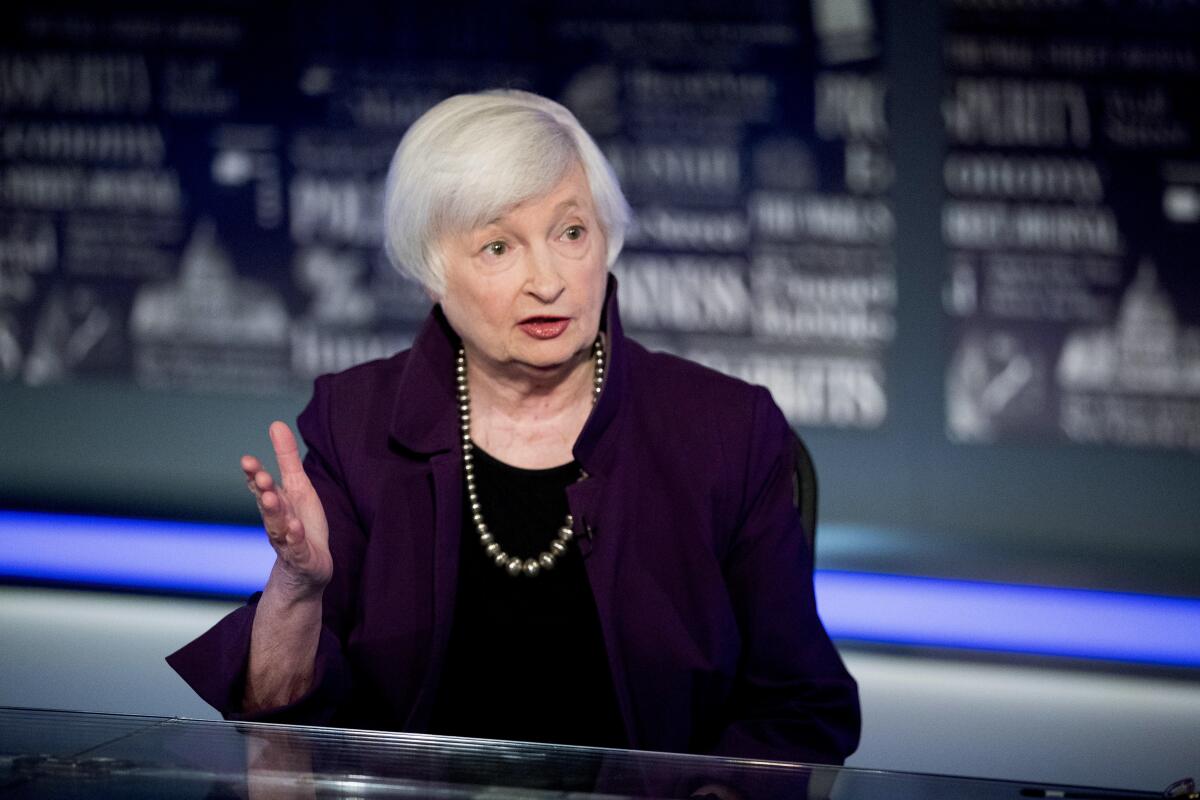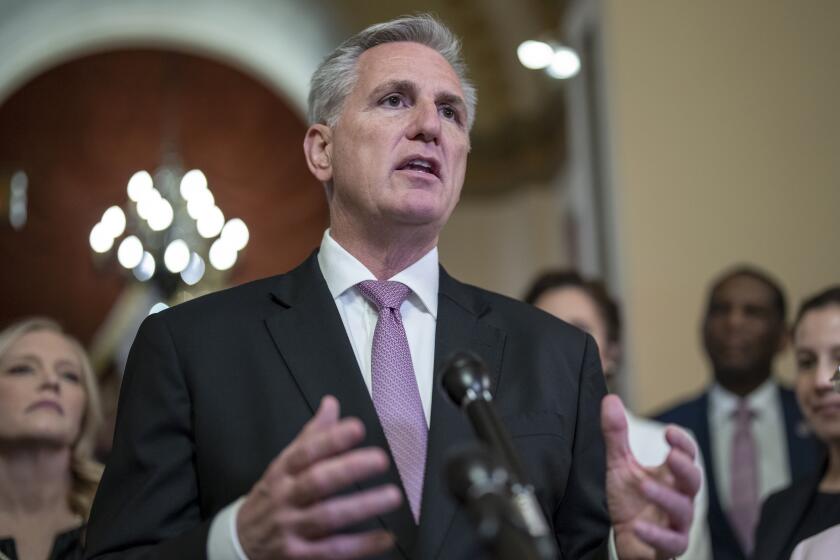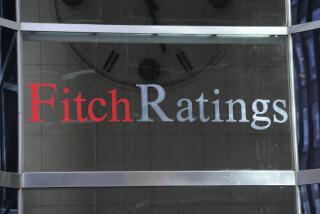Column: A big credit rating agency just downgraded the U.S. Should you worry?

- Share via
You may already have gotten bored with the incessant chatter in Washington and in the news about the decision by the credit rating agency Fitch to downgrade U.S. government securities.
If so, you’re not alone. The stock and bond markets are also bored. The evidence is their almost invisible reaction to Fitch’s Aug. 1 announcement. The interest rates on U.S. securities have barely budged, and the stock market hasn’t moved more than one might expect, since strong run-ups in prices, such as that in stock prices since the beginning of the year, normally pause at some point to let off steam.
For many economists and investors, Fitch’s downgrade reflects more poorly on Fitch than on the United States. Former Treasury Secretary Lawrence Summers (not an unalloyed fan of the Biden administration), called the downgrade “bizarre and inept.” Current Treasury Secretary Janet L. Yellen asserts that it’s “arbitrary and based on outdated data,” since most of the fiscal factors Fitch mentioned are moving in a positive direction.
What Fitch put in their statement has been true for a while, so why now? You scratch your head as to the timing of this.
— Economist and investor Mohamed El-Erian
What struck many observers as especially bizarre was not so much Fitch’s action, but its timing.
“What Fitch put in their statement has been true for a while, so why now?” remarked economist and bond maven Mohamed El-Erian in an interview with Yahoo Finance. “You scratch your head as to the timing of this.”
Get the latest from Michael Hiltzik
Commentary on economics and more from a Pulitzer Prize winner.
You may occasionally receive promotional content from the Los Angeles Times.
That’s understandable. On May 25, Fitch warned of an impending downgrade if the debt ceiling standoff between House Republicans and the White House were not resolved. Fitch stated then that “risks have risen that the debt limit will not be raised or suspended ... and consequently that the government could begin to miss payments on some of its obligations.”
But the standoff was resolved in time, with President Biden signing the resulting agreement on June 3. Yet Fitch cited the “repeated debt-limit political standoffs” anyway in its Aug. 1 announcement — never mind that the record shows that these conflicts are largely political theater, and that none has ever resulted in the U.S. defaulting on its debt.
Economist Brad Setser of the Council on Foreign Relations: “I could see a case for downgrading the US ... after the Trump tax cuts were passed [in 2017], ... after January 6 ... [and] before Congress suspended the debt ceiling (but not after).” The prices of long-dated U.S. bonds, which would have been likeliest to respond to a downgrade, actually point to continued strong investor demand, Setser observed.
Who wants us to take Fitch’s downgrade seriously? Mostly Republicans. Several of them hustled over to Fox Business to blame Biden for the downgrade.
Republicans are bowing to industry lobbyist in loosening state child labor laws. The inevitable result will be a rise in child deaths in the workplace.
“President Biden’s brinksmanship — not to mention the $10 trillion in new spending he and Washington Democrats passed over the past two years — pushed America’s credit rating off the ledge,” said House Ways and Means Committee Chair Jason Smith (R-Mo.).
Of course, the debt ceiling brinkmanship was entirely a GOP creation: Then-President Trump approved $2.3 trillion in spending for COVID relief himself, and his tax cuts have been a major contributor to the federal deficit.
It’s true that the stock market took a brief swoon around the time of Fitch’s announcement, with the Standard & Poor’s 500 index losing 1.6% from Aug. 1 through Aug. 3. But tying that action to the downgrade — or to any specific driver — is a mug’s game.
For one thing, the same period saw the indictment of Trump, a major development for presidential politics that could have rattled the stock market just as well. For another, the S&P 500 had racked up a rise of nearly 20% since the beginning of the year. Steep gains seldom continue without intermittent breathers, often triggered by some external event.
Anyway, as I write the S&P is still up about 17% for the year; annualized, that gain would exceed that of every year but two since the turn of this century.
So how should we think about the Fitch downgrade? Let’s take a look.
It’s worth knowing that this isn’t the first downgrade of U.S. securities by a credit rating service. The first one was delivered by S&P Global Ratings, also by a single notch to AA+ from AAA, in 2011, during an earlier debt-ceiling standoff. S&P has never reversed its decision, but it resulted in higher prices for Treasurys due to an investor flight for safe havens.
In other words, even when there were indications that the U.S. fiscal situation was troubled, investors fearful that the situation would have global implications sought safety in U.S. securities.
To almost all investors, the credit rating of U.S. bonds by Fitch, S&P and Moody’s (the third member of the credit-rating triumvirate) is utterly irrelevant to judgment of their value.
Inflation is down sharply, employment is holding steady and GDP is growing. But Americans are still blaming Biden for a lousy recovery.
Since the U.S. has never defaulted, Treasurys are regarded as the safest investments in good times and bad — even more so in bad. They are priced almost entirely on their interest rates relative to prevailing rates in the market (which are also pegged to Treasurys).
If you’re holding a U.S. bond with, say, a 3% coupon, it will be marked down relative to a U.S. bond with a 5% coupon. That’s different from how corporate or municipal bonds are valued, because those entities can default or go bankrupt. The role of the credit rating firms is to assess the likelihood of those eventualities.
The firms may not always be right — in fact, they’re often late in warning of an issuer’s sinking prospects — but their ratings provide cover for investment managers of funds that limit permissible holdings to securities of a given rating. For most investment funds, holding U.S. government paper is kosher under almost any condition.
That brings us to the nuts and bolts of Fitch’s analysis. To a great extent, it was based on politics rather than economics or finance. That’s a problem right there, because political realities are inherently more volatile than economic conditions — and Fitch is not especially better equipped than you or I to gauge them.
In its ratings statement, Fitch cited “a steady deterioration in standards of governance over the last 20 years, including on fiscal and debt matters.” A 20-year trend doesn’t seem very relevant to a sudden downgrade, unless some bright line has been crossed.
Fitch doesn’t identify one, beyond stating that “the repeated debt-limit political standoffs and last-minute resolutions have eroded confidence in fiscal management.” Yet those debt-limit standoffs have become part of the political landscape for more than a decade, so where’s the urgency?
In an interview with Reuters, Fitch director Richard Francis identified the Jan. 6 insurrection as an indicator of political polarization the firm found disturbing. But Jan. 6 was more than two years ago and nearly 500 participants have been sentenced to jail for their roles — not to mention Trump, who has been indicted in connection with the event. That sounds like a pointer to sensible government response, not instability.
Most of the firm’s other judgments rely on conjecture. “We expect the general government (GG) deficit to rise to 6.3% of [gross domestic product] in 2023, from 3.7% in 2022.”
The rich won’t be hurt a bit by the Biden/McCarthy debt ceiling deal. It’s the poor who will pay. That was Republicans’ priority all along.
The government projects that the deficit will rise to 6.8% of GDP next year from 6.0% this year, but then fall to 5% in 2028. More to the point, all these figures show a steep decline from the 14.9% level in 2020, its highest level since 1945.
Fitch also frets that “there has been only limited progress in tackling medium-term challenges related to rising Social Security and Medicare costs due to an aging population.”
Here, the firm may even be sugar-coating the reality — there has been no progress on those fronts, but whether it’s necessary to address them today, 10 to 12 years before they’re plainly necessary, is highly questionable. It’s arguable, indeed, whether implementing irrevocable changes in either program, say by cutting benefits or raising the eligibility age, is even advisable.
Fitch projects a “mild recession” late this year and early in 2024, but it may be behind the curve on that. Some recent prognostications are that the chances of a recession are receding.
On the plus side, Fitch notes “several structural strengths” of the U.S., including “its large, advanced, well-diversified and high-income economy, supported by a dynamic business environment.” There’s also the U.S. dollar’s role as “the world’s preeminent reserve currency, which gives the government extraordinary financing flexibility.”
So what’s the problem? Fitch’s failure to put its finger on anything resembling a crisis explains why its downgrade has elicited yawns everywhere except on Fox.
The GOP may appreciate being handed a new talking point with which to pretend that the Biden administration has crashed the economy (pay no attention to a nearly record-low unemployment rate, a consistent decline in inflation, strong GDP growth and a record of job creation that most recent Republican presidents could only dream about) but that’s all it has — a talking point.
More to Read
Get the latest from Michael Hiltzik
Commentary on economics and more from a Pulitzer Prize winner.
You may occasionally receive promotional content from the Los Angeles Times.














